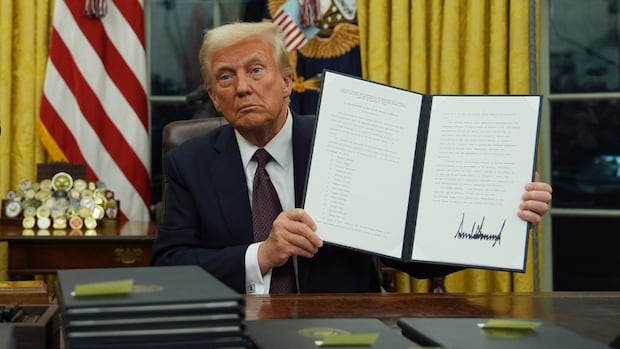
This land is not your land. Trump is taking steps to limit access to US citizenship
For generations, people who have lived and worked in the United States have assumed that if they have a child there, that child will have the right to citizenship, which comes with official documents and a government ID.
That may change soon.
US President Donald Trump published executive order on his first day in office, which stunned immigration followers with its scope.
All of them was expected he tried to end birthright citizenship for the children of people who entered the US illegally. But then he went a giant step further. As currently written, his order applies millions more people working legally inside the US nonimmigrant work visas — including many Canadians — throwing additional families into legal limbo. Only the children of at least one permanent resident would be spared.
“It's unprecedented,” said Angela Maria Kelly, senior counsel for the American Immigration Bar Association.
“This will be the historical transformation of our national identity. And only the basic principle that if you are born here, you belong here. And that your parents' past is not your future.”
The order has no retroactive effect. It only applies to future births starting next month.
At the same time, it means uncertainty for people and what could be a years-long, epic legal battle all the way to the US Supreme Court.
The current order appears to bar citizenship papers for a wide range of children, from tech workers on temporary visas to longtime workers at international institutions like the United Nations.
It says that no U.S. official shall issue or accept a citizenship document, such as a work, student or tourist visa, for the child of a mother in lawful but temporary status when the father is neither a citizen nor a permanent resident.

Challenging 125 years of law
Trump knows legal challenges are ahead. He admitted this while signing the order in the Oval Office on Monday evening.
“That's good. Their right. This is great,” Trump said as he signed the executive orders.
He expressed confidence that he has legal grounds to do so. But he was also unaware of the most basic fact of the case.
Trump stated that the USA is the only country that has citizenship by birth. “It's just absolutely ridiculous.”
But citizenship is granted as a birthright by dozens of countries around the world, for example The vast majority of America — including Canada.
Others have it conditionally, and some don't at all, including much of southern and eastern Europe, northern Africa and Asia.The change will make things especially difficult, Kelly said, for people who have children in the U.S. if their home country doesn't recognize them. extraterritorial birth.
This would put their children at risk of becoming stateless, she said. Pregnant women in the U.S. should not only study American law, but also their country's law and decide where to give birth.

Who is at risk?
Lawsuits immediately filed against the order listed some of the potential impacts on people, including one suit from more than 20 blue states.
The lawsuit says the elusive numbers would be stateless, with everything from a driver's license to a Social Security number to the ability to work legally.
“They will all be deportable and many will be stateless,” the lawsuit said.
“The result will be a multi-generational class of marginalized families, increasingly cut off from any country but the United States with each generation, but forever alienated.”
Another one a suit It was filed by Indonesian and Latino community groups in US District Court in New Hampshire.
A couple who came to the US on tourist visas in 2023 are said to have sought asylum. they have a baby in a month.
Another woman has been living in the US for over 20 years. he was brought illegally as a child, and now he is in the so-called Dreamers program. She's having a baby in March.
They are among several anecdotes mentioned in the lawsuit by undocumented people, keeping their identities secret.
The story begins with the Civil War
Their case may now hinge on the 157-year-old's interpretation constitutional amendment.
Written as a result of slavery 14th Amendment overturned the Dred Scott case, a racist US Supreme Court ruling that declared that descendants of African-American slaves could not be citizens.
The 1868 amendment clarified that US citizenship belongs to anyone born in the United States and “subject to its jurisdiction.”
The current battle hinges on the last part of the quotes.
Historically, it has been interpreted to apply to almost anyone born in the United States, except for certain children categories of diplomatsenjoying full diplomatic immunity.
But Trump's allies dispute the most significant case in the matter, involving the son of U.S.-born Chinese immigrants.
Wong Kim Ark was born in San Francisco's Chinatown in 1873. Twenty-two years later, he visited his parents' homeland, China, and was denied re-entry to the United States on the grounds that he was not a citizen.
And he was not eligible for citizenship because anti-Chinese law on time.
He fought his case all the way to the Supreme Court in 1898 led6-2 that Wong was, in fact, American.
The ruling pointed to more than just the 14th Amendment. It also made clear that the members of Congress who drafted the amendment knew it could apply not only to former slaves but also to immigrants.
A minority of justices then criticized the decision and because then, some called it a selective reading of the framers' intent.
Critics argue that the amendment was never intended to be so widely implemented, and 127 years later, opponents of the decision got a president who tried to challenge it.
“The privilege of United States citizenship is a priceless and profound gift,” said the opening remarks of Trump's executive order, as it continues to introduce new categories of people who do not currently qualify for it.
